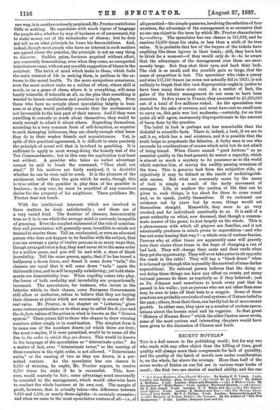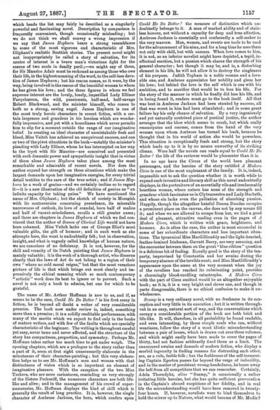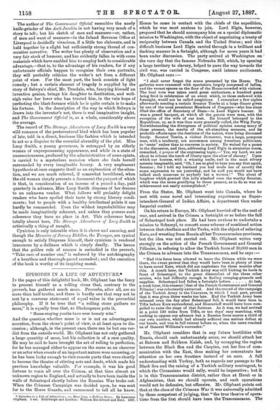RECENT NOVELS.* Tins is a dull season in the publishing
world ; but for any one who reads with any other object than the killing of time, good quality will always more than compensate for lack of quantity, and the quality of the batch of novels now under consideration is, on the whole, far above the average. More than half of the seven works of fiction on our list are in various ways books of merit ; the first two are stories of marked ability, and the one
• (1.) James Hburn, Free Church Minister. By Sophie F. F. Veltob. 2 vole. London and Paisley : Alex. Gardner.—(2.) Could He Do Better? By Arthur A. Hoffman. 3 vole. London: Hurst and Blaokett.—(9.) A Modern Circe. By the Author of "Molly Hawn." Soots. London Ward aud Downey.—(4.) Scamp. By J. Sale Lloyd. 8 vols. Loudon F. V. White and Co.—(5.) The Govern- ment Official, 9 vols. London : R. Bentley nod Son.—(6.) The Strange Adven- tures of Lucy Smith. By F. 0. Philips. 2 vole. London : Sonnensobein and Co. —17.1 Memoirs of Jeremy Dldler, the Younger. By the Author of "The New Democracy." 2 vols. London : Sampson Low and Co. which heads the list may fairly be described 88 a singularly powerful and fascinating novel. Description by comparison is frequently convenient, though occasionally misleading ; but we do not think we shall convey a wrong impression if we say that James Hepburn bears a strong resemblance to some of the most vigorous and characteristic of Mrs. Oliphant's realistic Scottish stories. The present novel might not inappropriately be called a story of salvation, for its centre of interest is a brave man's victorious fight for the rescue of two souls in deadly peril we might say of three, for Sir Maurice Adair must be reckoned as among those who owe their life, in the highest meaning of the word, to the self-less devo- tion of James Hepburn; but his rescue comes, as it were, by the way, being involved in the rescue of the beautiful woman to whom he has given hie love ; and the three figures in whom we feel supreme interest are the lovely, lonely, imperilled Lady Ellinor Farquharson, the wild, passionate, half-mad, half-savage Robert Blackwood, and the minister himself, who comes to both as a strong, saving angel. James Hepburn is one of the most truly heroic characters in recent fiction, with a cer- tain largeness and grandeur in his heroism which are wonder- fully impressive, and yet with a homeliness which never permits him to slip for a moment outside the range of our imaginative belief. In creating an ideal character of unmistakable flesh and blood, Miss Veitch has achieved an unequivocal success, and one or two of the pivot situations in the book—notably the minister's pleading with Lady Ellinor, whom he has intercepted on her way to the tryst with Sir Maurice—are conceived and presented with such dramatic power and sympathetic insight that in virtue of them alone ,Tames Hepburn takes place among the most remarkable and admirable of recent novels. Nor does the author expend her strength on these situations which make the largest demands upon her imaginative energies, for every trivial detail testifies to the care of the true artist ; and if James Hep- burn be a work of genius—and we certainly incline so to regard it—it is a new illustration of the old definition of genius as "an infinite capacity for taking pains." We have mentioned the name of Mrs. Oliphant ; but the sketch of society in Mossgieb with its controversies concerning precedence, its miserable narrowness of outlook, its love of scandal, born half of malice and half of vacant-mindedness, recalls a still greater name ; and there are chapters in James Hepburn of which we feel con- vinced that the author of Scenes of Clerical Life would not have been ashamed. Miss Veitch lacks one of George Eliot's most valuable gifts, the gift of humour ; and in such work as she attempts here, the want is undoubtedly felt ; but in observation, insight, and what is vaguely called knowledge of human nature, we are conscious of no deficiency. It is not, however, for the skill and veracity of its Dutch painting that James Hepburn is mainly valuable ; it is the work of a thorough artist, who discerns clearly that the laws of Art do not belong to a region of their own " where no cold moral reigns," but that the most veracious picture of life is that which brings out most clearly and im- pressively the ethical meaning which so much contemporary " artistic " work does its best to ignore or to pervert. Such a novel is not only a book to admire, but one for which to be grateful.
The name of Mr. Arthur Hoffman is new to us, and if, as seems to be the case, Could He Do Better ? is his first essay in fiction, he is beyond all doubt a writer of very considerable promise. The book now under review is, indeed, something more than a promise; it is a solidly creditable performance, with many of the merits which we expect to find only in the books of mature writers, and with few of the faults which are specially characteristic of the beginner. The writing is throughout careful yet easy, never tame and never affected, and the structure of the story has compactness, proportion, and symmetry. Perhaps Mr. Hoffman takes rather too much time to get under weigh. The opening chapters, which are a prologue to the story rather than a part of it, seem at first sight unnecessarily elaborate in the minuteness of their character-painting ; but this very elabora- tion helps us to see Mr. Hoffman's men and women with that distinctness of vision which is so important an element of imaginative pleasure. With the exception of the two Miss Tuckers, who are mere caricatures, reminding us very strongly of the Sisters Pecksniff, the numerous characters are both life- like and alive; and in the management of his crowd of super- numeraries, Mr. Hoffman displays the kind of skill which is generally the result of long practice. It is, however, the single character of Ambrose Jackson, the hero, which confers upon
Could He Do Better ? the measure of distinction which un- doubtedly belongs to it. A man of marked ability and of stain- less honour, not without a capacity for deep and true affection, Ambrose Jackson is essentially and confessedly a self-seeker to the very marrow. Men, women, and events are tools to be used for the advancement of his aims, and for along time he uses them not only with skill, but with success. When love comes to him, it is not, as an inferior novelist might have depicted, a tepid, in- effectual emotion, but a passion which shares the strength of his general character ; but though it may be, and is, a disturbing element in his life, he will not allow it to destroy the singleness of his purpose. Judith Topham is a noble woman and a love- able one, and Ambrose appreciates her nobility and gives her his love; bat behind the love is the self which is one with his ambition, and to sacrifice that would be to lose his life. For the story of the manner in which he finally did lose his life, and in losing found it, readers must go to the book itself. All that was best in Ambrose Jackson had been stunted by success, all that was worst in him had been stimulated ; and in some great failure lay his only chance of salvation. By a very ingeniously and yet naturally contrived piece of poetical justice, the author arranges that the blow which seems to crush, but which really emancipates and rescues, comes from the hand of the very woman upon whom Ambrose has turned his back, because he thought that in his world of action she would be powerless. This situation is exceptionally fresh and strong, but the story which leads up to it is by no means unworthy of its striking climax. Were half the novels one reads equal to Could He Do Better ? the life of the reviewer would be pleasanter than it is.
In no age have the Circes of the world been pleasant personages, and the heroine of the story entitled A Modern Circe is one of the most unpleasant of the family. It is, indeed, impossible not to ask the question whether it is worth while to expend such inventive and literary skill as this novel undoubtedly displays, in the portraiture of an essentially vile and irredeemably heartless woman, whose nature has none of the strength and grandeur which fascinates us in Clytemnestra and Lady Macbeth, and whose sin lacks even the palliation of absorbing passion. Happily, though the altogether hateful Donna Dnndas occupies a prominent place on the canvas, she does not by any means fill it ; and when we are allowed to escape from her, we find a good deal of pleasant, attractive reading even in the pages of A Modern Circe, which is written with grace, brightness, and humour. As is often the case, the author is most successful in some of her subordinate characters and less important situa- tions. The tyrannical Miss MacGillicaddy and the light-hearted, feather-brained Irishman, Garratt Barry, are very amusing, and the encounter between them on the great "blue-ribbon" question is a delicious bit of fooling. Equally good is the story of the tea- party, improvised by Constantia and her swains during the temporary absence of the terrible aunt; and Miss MacGillicuddy's appearance upon the scene at the very moment when the joy of the revellers has reached its culminating point, provides a charmingly blood-curdling catastrophe. A Modern Circe with the part of Circe omitted would be an altogether enjoyable book ; as it is, it is a very bright and clever one, and though in parts disagreeable, there is no ethical confusion to make it un- wholesome.
Scamp is a very ordinary novel, with no freshness in its con. caption and very little in its execution ; but it is written through- out in an easy, natural sort of way, and the conversations which occupy a considerable portion of the book are both brisk and life-like. It will, therefore, in all probability be found readable, and even interesting, by those simple souls who can, without weariness, follow the story of a most idiotic misunderstanding between a pair of lovers, which is drawn out over three volumes, and which might easily have been made to cover the pages of thirty, had not fashion arbitrarily fixed three as a limit. The enamoured swains and damsels of modern fiction, who display a morbid ingenuity in finding reasons for distrusting each other, are, as a rule, feeble folk ; but the feebleness of the self-torment-
ing Captain Egerton passes far beyond the verge of imbecility, and in the matter of persistent wrong-headedoess, he bears away the bell from all competitors that we can remember. Certainly, Adele Thorndyke, alias "Scamp," is occasionally a rather irritating little heroine, but she has quite sufficient provocation
in the Captain's absurd suspicions of her fidelity, and in real life the misunderstanding would have been removed in twenty- four hours. If, however, novelists were to bind themselves to hold the mirror up to Nature, what would become of Mr. Mudie
The author of The Government Official resembles the needy knife-grinder of the Anti-Jacobin in not having very much of a story to tell ; but his sketch of men and manners—or, rather, of men and want of manners—in the Inland Revenue Office at Liverpool is decidedly vivacious, if a little too elaborate, and is held together by a slight hat sufficiently strong thread of con- secutive narrative. The writer has plenty of observation and a very fair stook of humour, and has evidently fallen in with some materials which have enabled him to employ both to considerable advantage,—that is, to the advantage of his readers, for if any unfortunate officials happen to recognise their own portraits, they will probably criticise the writer's art from a different point of view. For the most part, the book consists of light comedy ; but a certain element of tragedy is supplied by the story of Selwyn's chief, Mr. Trosdale, who, fancying himself an inventive genius, brings his daughter to destitution, and well- nigh ruins her lover who has trusted him, in the vain hope of perfecting the blast-furnace which he is quite certain is to make his fortune. In the description of the way in which Selwyn is drawn into the inventor's net, there is real imaginative insight, and The Government Official is, as a whole, considerably above the average.
The record of The Strange Adventures of Lucy Smith is a very wild romance of the preternatural kind which has been popular of late, told in a direct, business like fashion which is intended to act as a disguise to the essential absurdity of the plot. Miss Lucy Smith, a young governess, is entrapped by an elderly woman of unprepossessing appearance, and while in a state of unconsciousness, produced by the administration of some opiate, is carried to a mysterious mansion where she finds herself surrounded by every imaginable luxury. A very unpleasant hypothesis at once suggests itself as an explanation of the situa- tion, and we are much relieved, if somewhat bewildered, when the old woman simply presents a document the purport of which is that, in consideration of an income of a pound a day, paid quarterly in advance, Miss Lucy Smith disposes of her dreams to an unknown vendor. What follows will probably delight readers who have spoiled their taste by strong literary condi- ments; but to people with a healthy intellectual palate it can hardly be commended. Even the wildest improbabilities may be made imaginatively coherent, and unless they possess such coherence they have no place in Art. This coherence being totally absent here, The Strange Adventures of Lucy Smith is artistically a thing of naught Cynicism is only tolerable when it is clever and amusing, and though the Memoirs of Jeremy Diddler, the Younger, are cynical enough to satisfy Diogenes himself, their cynicism is rendered innocuous by a dullness which is simply deadly. The lesson that the golden rule of success is embodied in the proverb, "Take care of number one," is enforced by the autobiography of a heartless and thorough.paced scoundrel ; and the execution of the book is worthy of its inspiring moral.




































 Previous page
Previous page